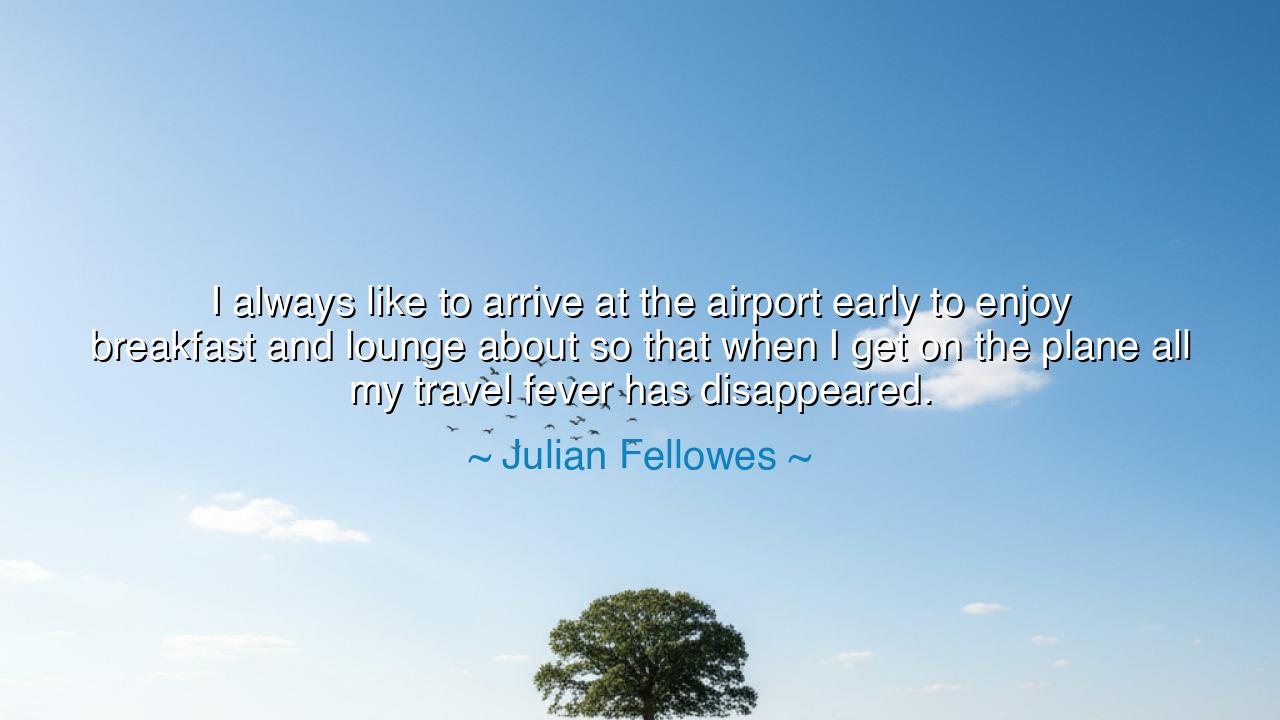
I always like to arrive at the airport early to enjoy breakfast
I always like to arrive at the airport early to enjoy breakfast and lounge about so that when I get on the plane all my travel fever has disappeared.






"I always like to arrive at the airport early to enjoy breakfast and lounge about, so that when I get on the plane all my travel fever has disappeared." Thus speaks Julian Fellowes, and though his words appear simple, they are filled with the wisdom of patience, preparation, and calmness of spirit. In them lies a teaching not only about journeys of the body, but also about journeys of the soul. For every great undertaking begins not in haste, but in readiness. The man who rushes is a slave to worry; the man who arrives early is master of himself.
The ancients knew this truth well. The Stoic philosopher Seneca warned that "he who hurries delays." To face the uncertain—whether it be the sea voyage of the Greeks, the march of a Roman legion, or the ascent of a pilgrim’s path—one must prepare the heart as much as the body. Fellowes’ choice to sit, to breathe, to eat his breakfast in peace before departure is an act of conquest over anxiety. It is the stilling of the storm within, so that when the journey begins, the spirit is already at rest.
Consider the story of the Chinese admiral Zheng He, who commanded vast fleets across the seas in the 15th century. His journeys reached far coasts, bringing glory to the Ming Empire. Yet before each voyage, he spent months in preparation—securing provisions, restoring discipline, tending to the morale of his sailors. By the time his ships unfurled their sails, the fever of uncertainty had already been calmed by order and foresight. In this, Zheng He and Julian Fellowes speak the same wisdom: that peace before the journey is the first step to victory in the journey itself.
The airport lounge in Fellowes’ words is more than a place of waiting; it is a symbol of sanctuary. Life, like travel, is filled with turbulence—delays, storms, and sudden changes of course. But the one who makes time to rest before the storm meets it with greater strength. In this way, Fellowes reminds us that life’s pauses are as essential as its movements. A calm beginning yields a calmer road, just as the soldier who sharpens his blade before battle fights without panic.
Children of tomorrow, do not despise the quiet moments before the great events of your lives. Exams, journeys, weddings, battles, and partings—each demands preparation of the soul. Do not rush headlong into them with your heart racing and your mind unsteady. Instead, be like Fellowes: arrive early, breathe deeply, nourish yourself, and find peace before the gates of departure. In doing so, you conquer the fever that would otherwise cloud your steps.
Practical action lies within your reach. When you face a challenge, prepare before the hour arrives. Rise earlier than you must. Give yourself space to pause, to eat, to breathe. Enter meetings, journeys, and trials not as a hurried traveler, but as a calm voyager ready for the skies. Your calmness will steady others; your stillness will spread like a shield of peace around you.
Thus the lesson is clear: the one who arrives early does not lose time, but gains mastery. The one who pauses before the journey is already halfway to triumph. Fellowes teaches us that to quiet the heart before departure is to ensure a smoother flight through life. So, when your own travel fever stirs, remember this: conquer it not by force, but by patience, ritual, and calm beginnings.






AAdministratorAdministrator
Welcome, honored guests. Please leave a comment, we will respond soon